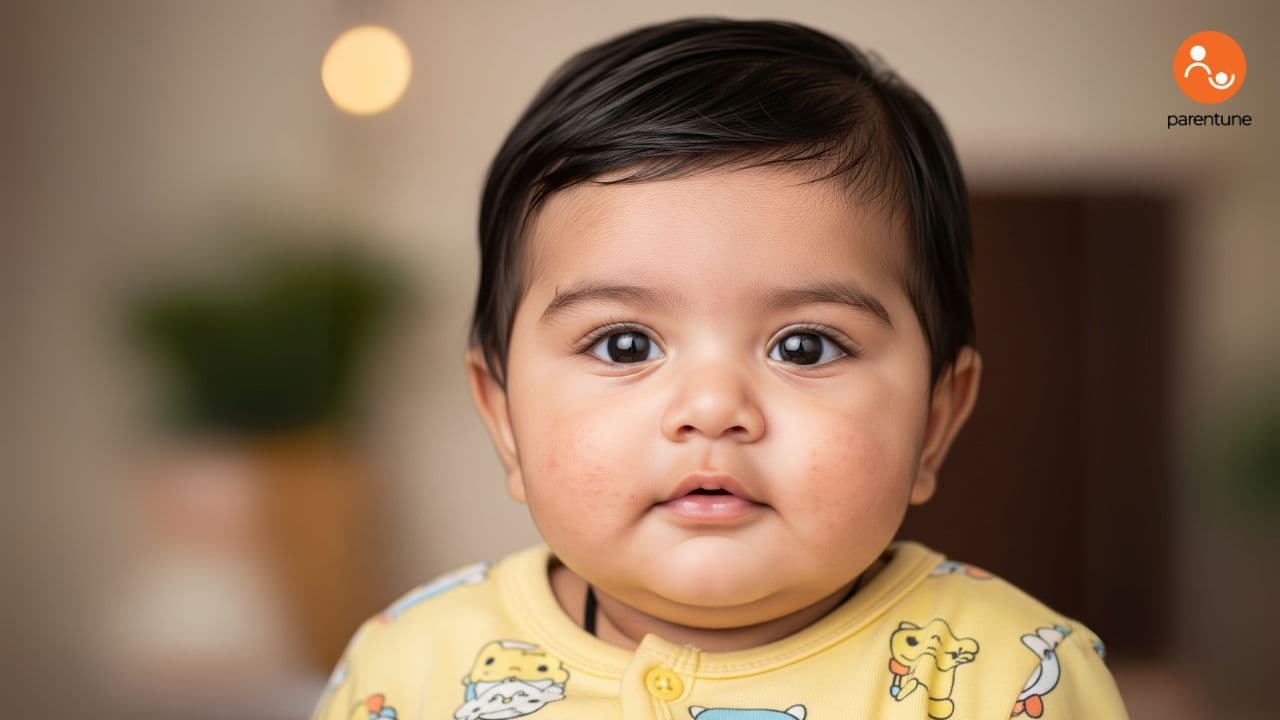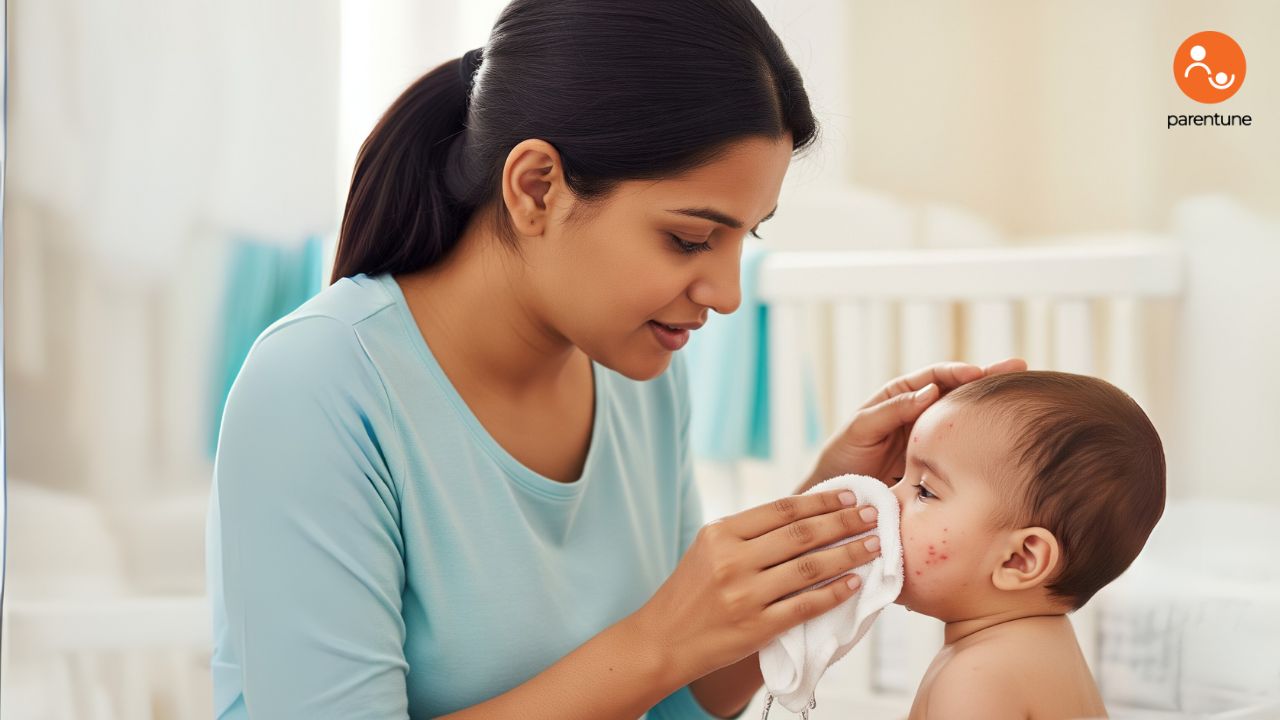skincare
How To Get Rid Of Baby Acne Fast: Safe Home Remedies & Paediatric Tips

It looks worse than it is.
That tiny red rash on your newborn's cheeks? It isn’t the start of allergies. It isn’t poor hygiene. It’s baby acne—and it’s more common than you think.
Most newborns develop baby acne within the first few weeks of life. It usually clears up on its own. But for new parents, those bumps can be distressing. We look at their soft, perfect skin and panic at the first sign of disruption.
So how do you deal with it?
Doctor Q&As from Parents like you
Let’s break it down.
What Is Baby Acne?
Baby acne, or neonatal acne, appears as red or white bumps (pimples or pustules) mostly on a newborn’s cheeks, forehead, and sometimes chin. It can show up around 2 to 4 weeks of age and typically lasts a few weeks to a few months.
Unlike teen acne, baby acne isn’t caused by clogged pores. It’s likely triggered by hormones passed from the mother to the baby during the final stages of pregnancy.
Key Insight: It’s hormonal, not hygiene-related.
What Does Baby Acne Look Like?
-
Tiny red or white bumps
-
Mostly on cheeks, sometimes forehead and chin
-
No blackheads or deep cysts
-
Skin might look inflamed or blotchy
It can flare up when the baby is fussy, hot, or drooling. But it almost never bothers the baby. Just the parents.
Also read:
When Should You Worry?
In most cases, you shouldn’t.
But if your baby's skin:
-
Looks scaly or crusty
-
Has yellow discharge or swelling
-
Develops a rash on other parts of the body (like legs or arms)
-
Lasts longer than 3 months
Then it's best to check with a paediatrician.
Parentune Tip: Always trust your parental instincts, but double-check with an expert before trying over-the-counter creams.
What NOT to Do for Baby Acne
Let’s start with this because many well-meaning actions can make things worse:
-
Don’t scrub or exfoliate the skin
-
Don’t use adult acne creams or face wash
-
Don’t pop or pick the pimples
-
Avoid oil-based lotions that may clog skin further
Remember: Gentle wins. Every time.
Safe Home Remedies to Soothe Baby Acne
Here are safe, paediatrician-approved ways to help your baby’s skin heal gently:
1. Cleanse with warm water and soft cloth
-
Just once daily
-
Use lukewarm water and no soap
-
Pat dry gently
2. Use mild, fragrance-free baby cleanser
-
Once every 2-3 days if needed
-
Brands like Cetaphil Baby, Sebamed Baby, or any paediatrician-recommended formula
3. Apply breast milk
-
Dab a few drops of breast milk on affected areas
-
Its natural antibacterial properties help soothe inflammation
4. Keep skin dry and cool
-
Avoid overdressing or overheating
-
Keep baby in breathable cotton clothes
5. Moisturize with caution
-
Use a gentle, non-comedogenic baby moisturizer only if skin is dry
-
Look for labels like "hypoallergenic" and "fragrance-free"
6. Resist the urge to overtreat
-
No home remedies involving lemon, turmeric, or essential oils
-
Baby skin isn’t a DIY lab
Quotable Insight: Sometimes the best remedy is time and trust.

Paediatric Tips to Fast-Track Healing
Sometimes, baby acne lingers longer than expected. Paediatricians may recommend:
-
Prescription creams (usually mild hydrocortisone or antifungal if yeast is involved)
-
Rule out other conditions like eczema, cradle cap, or heat rash
-
Maintain a skincare journal to track what works and what doesn’t
If in doubt, a quick virtual consultation via platforms like Parentune can help you connect with verified paediatricians.
How Long Does It Take to Clear?
Most cases resolve within 4 to 12 weeks without any treatment.
Yes, that long.
The skin goes through its own rhythms. And your baby’s skin is still adjusting to the outside world. It’s a transition period. Think of it as skin’s way of learning to self-regulate.
What Makes Baby Acne Worse?
Several everyday factors can cause flare-ups:
-
Saliva from drooling
-
Milk residue left on the skin
-
Rough fabrics or scratchy bibs
-
Harsh detergents
-
Hot and humid environments
Systems Insight: It’s rarely just one cause—it’s the system of little irritants adding up.
You may also like to read:
Dry Skin Causes, Symptoms & Ways To Prevent in Babies
What to Use, What to Avoid
Here’s a quick decision table for tired parents at 2 AM:
|
Product Type |
Safe for Baby Acne? |
|
Baby soap (fragrance-free) |
Yes (in moderation) |
|
Breast milk |
Yes |
|
Coconut oil |
No (may clog pores) |
|
Essential oils |
No |
|
Over-the-counter acne cream |
No |
|
Steroid cream (Rx only) |
Only if prescribed |
|
Baby moisturizer (light, non-comedogenic) |
Yes (if skin is dry) |
When to See a Doctor
Call or consult your paediatrician if:
-
Acne spreads aggressively
-
Pimples ooze yellow fluid
-
Baby seems irritable or uncomfortable
-
Rash lasts beyond 3 months
You know your baby best. But it never hurts to ask an expert.
Parentune’s verified paediatricians are just a click away, offering you expert-backed support with the reassurance that you’re not alone in this.
Final Thought: It’s a Phase, Not a Flaw
Baby acne is temporary. Your baby's beauty isn’t defined by clear skin. It’s defined by the way they look at you with those sleepy eyes after a feed.
So breathe.
Support their skin the way you support their sleep: with consistency, gentleness, and trust.
And when in doubt, tap into your parenting village. Communities like Parentune exist to bring expert advice and lived experience together—so you don’t have to navigate these milestones alone.
Because the truth is: no parent has all the answers. But together, we usually figure it out.
Be the first to support
Be the first to share
Related Blogs & Vlogs
No related events found.